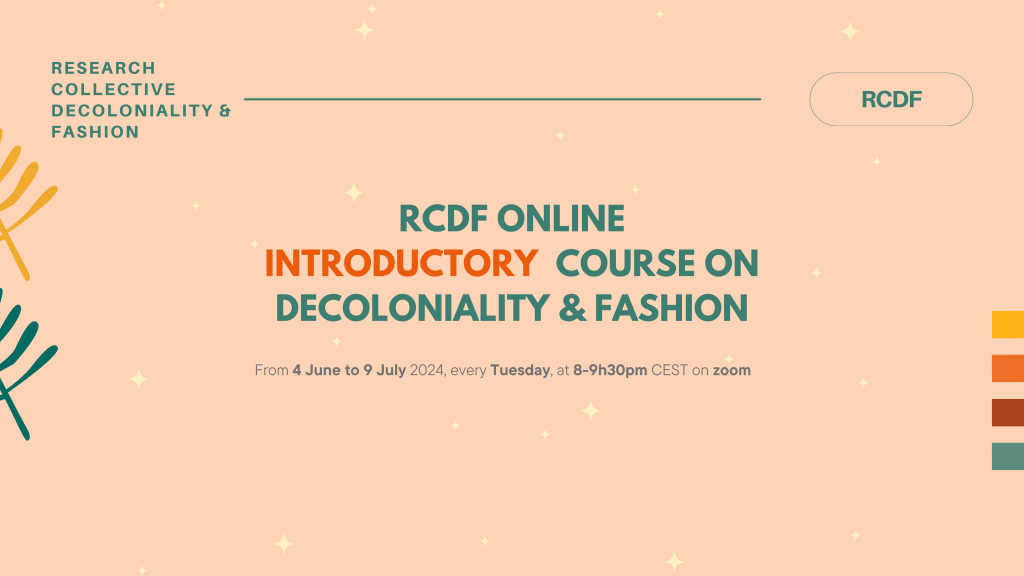Course description
This six-week online introductory course on decoloniality & fashion explores both conceptual and practice-based aspects of decoloniality and fashion and presents participants with an exciting collaborative opportunity—through its discursive and participatory format—to explore a range of tools, formats and practices that will strengthen their position to disrupt dominant eurocentric fashion and formulate diverse, ethical and culturally sustainable alternatives.
The course is aimed at students, researchers, educators, curators, fashion practitioners, critical thinkers and activists who are committed to undoing the violence and erasure of contemporary fashion. We welcome participants from all walks of life, with or without a background in fashion. The classes are every Tuesday evening, 8-9:30pm CEST, in English and consist of 1.5 hours, including a lecture-type presentation, assignments in smaller breakout rooms sessions and group discussions. Although the focus is on knowledge transmission, we aim to learn from each other, with each other. The course is convened by some of the most exciting decolonial + fashion thinkers, including Sandra Niessen, Benjamin Wild, Angela Jansen, Mi Medrado, Erica de Greef and Sarah Cheang.
Organised around six topics, the course examines some key problems of the contemporary fashion industry and their roots in the modern civilization project. It explores obscured intersectional forms of discrimination, erasure and exploitation within contemporary fashion perpetuated in sustainability discourses, fashion curricula and curation practices. It explores a number of decolonial alternatives that work towards a politics of redress, a politics of aesthetic and epistemic restitution and repair and a politics of giving back a place in the present, of hosting and emplacing what has been denied and erased.
Course details
- Duration: 6 online sessions via ZOOM, once a week, on Tuesday evenings at 8-9:30pm CEST.
- Commitment: participants are expected to come to class prepared, having prepared the selected materials. Each week participants are requested to write a 500-word reflection on the topics addressed. There is a (free format) final assignment which can be a writing, drawing, video, audio or object-based.
- Course fee: 150€ (plus 8,46 registration fee; one scholarship is available; application by email before 15 May 2024).
- Registration: Before 28 May 2024 on Eventbrite (max of 20 participants).
- Contact: info@rcdfashion.com
Course Outline
| Tuesday 4 June 2024: Introduction, by Angela Jansen, Mi Medrado & Benjamin Wild |
| In this session, we will present the course outline, its decolonial framework of knowledge creation and sharing and our positionalities and responsibilities. We will introduce the key propositions of decolonial thinking and how these relate to fashion. Participants will be asked to share how they come to decoloniality and fashion. |
| Tuesday 11 June 2024: Decoloniality and sustainable fashion by Sandra Niessen |
| The accepted framework for sustainable fashion focuses on reducing the throughputs of the industry: energy and materials. This framework rests on a definition of fashion as ‘style change through time,’ which emphasizes the materiality of fashion seen through the lens of contemporaneity. This session, students will be invited to explore fashion as social and economic processes that create sacrifice zones and hierarchies that serve to exclude. Unless it is radically fair, a sustainability framework is bound to fail. |
| Tuesday 18 June 2024: Decoloniality and fashion studies by Sarah Cheang |
| Decolonial thinking provides an intervention into the coloniality of knowledge and value hierarchies in art and design. This can shift fashion studies in ways that challenge racism, by questioning the impact of colonial language, concepts and methods. In this class, as active participants, we will highlight the ways that ‘race’ figures at the intersections between research, teaching and museum practices, and think critically about how discussions of ‘race’ and coloniality occur in fashion studies, in order to more successfully counter rather than reinscribe injustice, and acknowledge and care for a wider range of cultural positions. Often, decolonial efforts struggle with the inescapable conditions of capitalist modernity. Embracing unresolved contradictions and paradoxes, we will give space to questions of process and being-in-process in challenging the racialized foundations of power and distinction encoded in fashion ideologies. |
| Tuesday 25 June 2024:Decoloniality and fashion curation by Erica de Greef |
| This session explores the colonial violence of fashion museums. In order to seek out the decolonial affordances of these sites and/or their collections, we will draw on fashion as an embodied politics of remembering. The session invites participants to share a ‘material memory’ that can tell an alternate story, especially those that speak from the global south, that offer decolonial options, and that fill in the gaps of erasure and marginalisation. |
| Tuesday 2 July 2024: Decoloniality and fashion activism by Tamara Poblete and Loreto Martinez |
| In 2016 Tamara Poblete and Loreto Martínez formed Colectivo Malvestidas (Poorly Dressed Collective) in Santiago, Chile, in response to the need to produce knowledge from and with Latin America about fashion and clothing, a territory that they understand as a potential from which to imagine emancipated futures. From a decolonial feminist and transdisciplinary perspective, they have carried out a series of projects and activities committed to the visibility and development of disruptive and counter-hegemonic discourses in fashion, clothing and the body: performances, exhibitions, curatorial work, publications and conferences. For this session, they will share some of their projects in Spanish, with English translation. |
| Tuesday 9 July 2024: A Politics of Redress |
| In this final session, some hosting communities from the Global Fashioning Assembly (GFA) will share their journeys and efforts in creating decolonial cracks in the dominant modern-colonial fashion system. We will collectively explore alternative futures for fashion, demanding radical transformations towards a global fashionscape that is ethical, just and fair for everyone. How can we collectively bring about these radical transformations? How can we work collectively towards a Politics of Redress, a politics of aesthetic and epistemic restitution and repair? How can we host and give back a place in the present, to host and emplace what has been denied and erased? |

Leave a comment